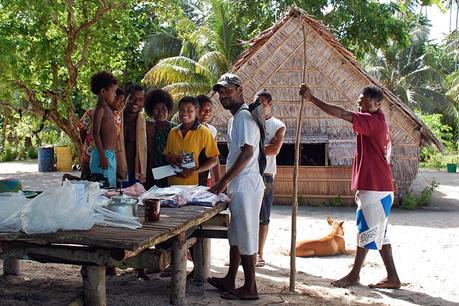
Cruising offers the chance to meet people of vastly different experience in different corners of the world and find common ground. Sometimes the exchange is bounded in a single encounter. Sometimes it’s stretched over a few days, and sometimes for years as we stay in touch. One family in Papua New Guinea is particularly special to us: once or twice a year since our visit four years ago we trade letters with Mollina and Wesley when a cruising boats stops at their island in Ninigo, Papua New Guinea (PNG).
They’re typical of many in PNG: family needs are met by bartering, building, or foraging. Theirs not a cash economy, because there are so few opportunities to earn money. Where they live on Mal island in Ninigo, there aren’t roads, or stores, or power, or water or a decent medical clinic. They must make, find, or trade for what they need.
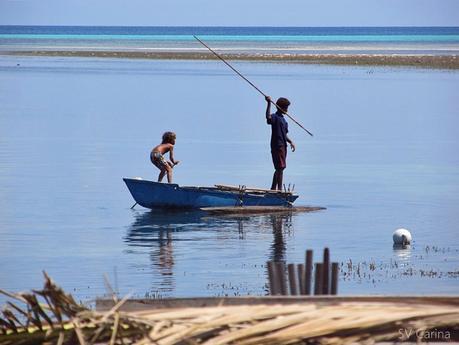
Fishing isn’t for fun, it’s for dinner. Kids in Ninigo; photo courtesy SV Carina.
To some this will sound idyllic: living in harmony with your environment, working with it to meet your needs. If that’s you, please take off those rose-tinted lenses and consider stomping on them, because this is a difficult life. There is a simple beauty, yet it holds few opportunities and little self-determination. Education, medical care, or basic tools require cash. You can’t trade a basket of yams to send your kids to school or buy antibiotics. But without opportunities to earn money, basic needs for education and health care are difficult or impossible.
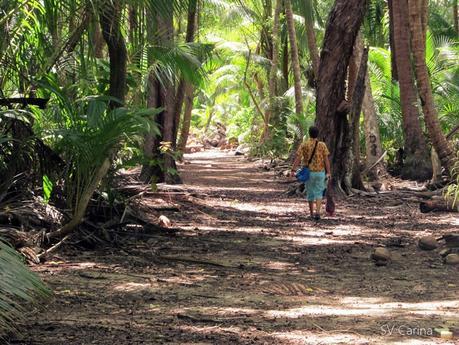
This is the main road on Mal. Photo courtesy SV Carina.
It’s hard to comprehend from our privileged position how fragile their existence is. A few months ago, Mollina was very sick (I wrote about it here). We learned about it from a visiting cruising boat, Carina, who has taken many of the pictures in this post. Mollina was suffering complications from childbirth; her local options were exhausted; it is a multi-day boat ride, in pain, to an island with better treatment available. But she did, and instead of proper care and a pelvic exam, she was just given a prescription to fill…which is like blind navigation and without the funds to pay for it. I feared for her.
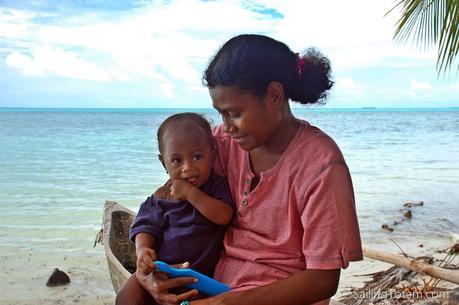
Mollina in 2012 with her firstborn, Finn, during our visit. Ninigo’s Madonna and child.
The good news is that Mollina is doing better now. Following a multi-day boat trip with her husband Wesley and two of their children to Manus island, where they could stay with family and seek medical care, her illness seems to be resolved.
Being on this bigger island opened an opportunity: Wesley can make another trip (a few more days in an open boat) from Manus to a more distant island to buy betel, and bring it back to Manus to sell. The cash they can earn from will make a huge impact on their lives. It’s money for their kids to go to school. Money for medical care. Maybe they will get a roof for their house that lasts more than a couple of seasons, or LED lights for a solar panel. I don’t know, but the details are less important than the possibility of unprecedented control over their lives and options.
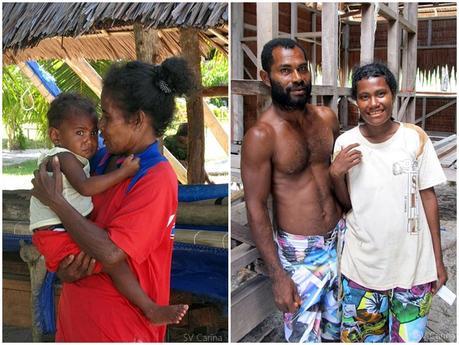
Baby Behan (my namesake!) scared of the camera at left… Wesley & Mollina at right. Photos courtesy SV Carina.
In true Catch-22 fashion, they need money to fund this enterprise. Wesley has borrowed much of what he needs from his “wontok” (literally, “one talk”: clansmen, the people who share his dialect), but it’s not enough. I hope to raise, and loan, the balance he needs—and I hope you’ll contribute. Their goal is $5,000 Kina, which is approximately US$1,600.
A few notes on the loan:
First, why do they need help ? Because they can’t get loans from a local bank without identification (another complication of life in remote PNG, but remember, we’re talking about islands without roads or electricity or fresh water or sewage: really, who ID?). Also, honestly? It’s just as well the banks are out, since what we heard about their practices during our stay sounded predatory for families like this.
Second, what about microfinance lending, like Kiva? (LOVE KIVA!) I did research microfinance organizations , but have not found a program that’s accessible to them. Mostly, they don’t exist in PNG. But the research process and the time a few people took to refer me to contacts and resources (thank you Elizabeth at Grameen, and Joe at ONE, your support means more than you know) opened my eyes to the value of direct loans, and the tremendous success they have in changing lives.
Finally: whatever amount I can raise is, as stated, a LOAN and not a gift. This includes risks. I anticipate Mollina and Wesley will pay it back, and in turn I can repay donors, but there’s no guarantee. PayPal makes repaying donors easy. As there isn’t a bank that we’ve found which can manage it, this part goes on faith. We (Totem) are a conduit only and take no money, only share goodness. We wish the best for Mollina and Wesley, for opportunities that so many of us take for granted. I cannot guarantee this loan: I can only say know them as incredibly hardworking, honest people.
Can you please help with a contribution?
Please use the PayPal button below to donage. You don’t need a PayPal account. If you send-to-a-friend, PayPal won’t take a cut. NO DONATION IS TOO SMALL. [temp update: I’m told this button isn’t working. While I get it fixed, there’s another PayPal donate button on the right side of this page that DOES work… just scroll up to find it. It looks just like this yellow one, without the credit card icons. thank you!]
I’ll post updates to Totem’s Facebook Page as funds are raised with daily with progress on the loan, so there’s visibility towards reaching the goal. I’m happy to email directly with donors who don’t use Facebook, and donors can tell me if they prefer to remain anonymous.
For more beautiful pictures and stories from Carina’s visit to Ninigo this year, see their blog posts here, here, and here.
For more about our unforgettable time in Ninigo, see these posts on SailingTotem.com.

